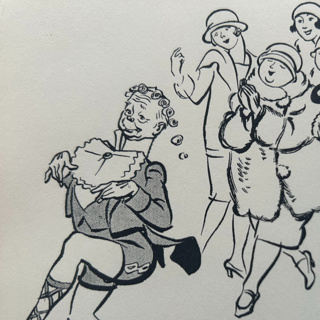
172. Liberals back, great power tensions too
Arthur Balfour’s intention in resigning as Prime Minister but without a general election was probably to oblige Liberal leader Henry Campbell-Bannerman to form a government, which might force their divisions to the surface. That would weaken their chances in an election that was bound to be held soon. There was a curious symmetry between the divisions in the main parties. The Liberals were split three ways over the Boer War. Liberal Imperialist right wing backed Britain’s military intervention, while the left, sometimes called pro-Boer, opposed it, and in the middle a group around the leader accepted the need for war but denounced its most brutal aspects (such as the concentration camps). Meanwhile, the Unionists were split three ways over tariff reform. The ‘wholehoggers’ backed a full system of import tariffs to protect British trade, the free traders wanted to stick with the old doctrine of tariff-free commerce, and a group around the leader accepted the need for reform but wanted to proceed more cautiously. Unfortunately, tariff reform was topical while the war had been over for three years. The Liberals were able to unite in attacking the government, specifically over tariff reform. And they won their last landslide in the 1906 election. Despite the end of the Boer War, the new Liberal government faced a world haunted by the spectre of renewed war. There was uncertainty over who the enemy would be if a new war broke out. The traditional enemy was France, and Britain likes its traditions. But an increasing threat was now coming from across the North Sea in Germany. Politicians and even novelists (the latter best represented by Erskine Childers and his Riddle of the Sands) were beginning to warn that the German threat was the more serious. The entente cordiale with France in 1904 showed Britain beginning to move closer to France and further away from Germany. Then Kaiser Wilhelm II of Germany showed up in Tangier in Morocco, making a speech designed to provoke France, and tensions quickly grew. The conference that ended the crisis failed to address Germany’s issues. That made Tangier just the first of a series of crises that set two groupings of European great powers increasingly at odds with each other. Finally, this episode also talks about a small step forward in the ugliest of the European colonies in Africa, Congo. Again with a link to a novel. Illustration: A 1904 British cartoon on the Entente cordiale: John Bull (Britain) walking off arm-in-arm with Marianne (France), turning their back on Wilhelm II of Germany, whose sabre is poking out of his coat. A Punch cartoon by John Bernard Partridge. Music: Bach Partita #2c by J Bu licensed under an Attribution-NonCommercial-No Derivatives (aka Music Sharing) 3.0 International License.
10 Dec 202314min

171. Tories on the rocks
The divisions among Unionists – the Conservative Party and the Liberal Unionists, then in government together – over tariff reform massively damaged their electoral chances and came as a real gift to the Liberals. That was on top of Balfour’s Education Act of 1902, which had allowed the Liberals to heal their rifts over the Boer War and come together in attacking the government. It looked as though the Unionists were heading for a drubbing at the polls in the next general election. But the Liberals weren’t complacent. One of the things they did was come to an agreement with the new Labour Representation Committee led by Keir Hardie, now with four MPs, not to stand a Liberal candidate against theirs in constituencies where they had a real chance of beating the Tory. This may have been a smart move by the Liberals, maximising Tory losses at the subsequent general election. Then again, it may have been a terrible self-inflicted wound, letting in a party that would soon eclipse them as the main party of opposition to the Tories. When the election came, it was a disaster for the Conservatives and a tremendous win for the Liberals, which took 397 seats in a House of Commons f 670. Labour too surged, wining 29 seats, 24 of them in constituencies covered by the agreement with the Liberals. The Liberal majority meant that the doors had opened for the leader Henry Campbell-Bannerman to make some real changes in Britain. Sadly for the Liberals, however, though they didn’t yet know it, they had just had their last landslide election win and would soon have their last elections wins of any kind. They were also starting on their last term in government on their own, rather than part of a coalition. They might be celebrating the present, but the future would turn out much bleaker. Illustration: Sir Henry Campbell-Bannerman, Liberal leader who led the Liberals into their election landslide in 1906. The picture is from 1907, by London Stereoscopic & Photographic Company, National Portrait Gallery P1700(86b) Music: Bach Partita #2c by J Bu licensed under an Attribution-NonCommercial-No Derivatives (aka Music Sharing) 3.0 International License.
3 Dec 202314min

170 Unionism: the gathering storm
A factor of small but growing importance at the end of Salisbury’s premierships, and during Balfour’s that followed, was offered by the Labour Representation Committee. It had been formed by trades unions working with left-wing parties of the working class, most notably Keir Hardie’s Independent Labour Party. With no MPs before the election of 1900, it had grown to four by 1903 which, in an environment in which third parties have trouble establishing themselves, was a substantial development. Meanwhile, the ruling Unionists were beginning to divide against each other. The question that finally split them was Tariff reform, the same issue that had split them back in 1846 when Robert Peel repealed the corn laws to usher in a long period of free trade without tariffs, but in the opposite direction: the tariff reformers at the start of the twentieth century, led by Joseph Chamberlain, wanted to reintroduce tariffs. The aim was both to create barriers protecting British industry and agriculture (even if that meant increasing the price of food, painful above all for the poor), and to allow for imperial preference, the system which would draw the colonies closer to the mother country by exempting their economies from certain tariffs. Three factions emerged within the Unionist coalition, right up to cabinet level. One, led by the Chancellor of the Exchequer, remained wedded to free trade. A second, the Prime Minister’s, was sympathetic but wanted to proceed slowly. The third, Chamberlain’s, was for rapid introduction of tariffs and imperial preference. Split parties don’t win elections, and now the Unionists were hopelessly split. With an election looming. Illustration: Some of the white, male attendees at the 1902 Colonial Conference. Joseph Chamberlain is in the middle of the front row, with Wilfrid Laurier,Prime Minister of Canada to his right (our left). Music: Bach Partita #2c by J Bu licensed under an Attribution-NonCommercial-No Derivatives (aka Music Sharing) 3.0 International License.
26 Nov 202314min

169. Anti-Immigrant? Or just anti-Semitic?
A major issue the Balfour government had to deal with was immigration. That became a thinly veiled pretext for anti-Semitism, since increased persecution of Jews inside the Russian empire sent huge numbers abroad seeking for refuge. A great many reached London, though far fewer than was often claimed. This episode looks at the reactions to the problem, which was often surprising, at least in appearance. Some Jewish leaders backed measures to restrict immigration. So, at one time, did the kind of figure you would imagine to be more sympathetic to people fleeing persecution, such as Keir Hardie in the forerunner of the Labour Party, though he and his colleagues later came down firmly against anti-immigration measures. Many of the backers, though, were the usual suspects. Some were genuinely convinced that what they were seeking was restriction on destitute and undesirable immigrants. Many others, however, felt that what was really being sought was an anti-Semitic measure to keep Jews out of Britain. Illustration: Sir William Evans-Gordon, cartoon by ‘Spy’, from ‘Vanity Fair’, 11 May 1905 National Portrait Gallery D45274 Music: Bach Partita #2c by J Bu licensed under an Attribution-NonCommercial-No Derivatives (aka Music Sharing) 3.0 International License.
19 Nov 202314min

168. Balfour's bad luck
Poor Balfour. He achieved a surprising amount considering how little time he had as head of government. What made it worse was that most of the measures he pushed through attracted at least as much criticism as praise. Often they caused deepening rifts amongst his own Unionists and even, on at least one occasion, strengthened the Liberals by helping to unite them again after their own deep splits on the Boer War. At least he did manage to get an Entente Cordiale with the French, ratcheting way, way down the traditional tensions between Britain and its neighbour across the Channel. On top of that, he had to deal with an old friend, George Curzon, who as viceroy of India found himself, like other colonial governors, unable to resist the temptation to launch a military adventure. The expedition into Tibet cost lives, though mostly among the poorly armed Tibetans, cut down by the superior British weapons, and in the end achieved virtually nothing. Which was entirely emblematic of Balfour's time in the top job. Illustration: Detail of John Singer Sargent’s portrait of Balfour in 1908. National Portrait Gallery 6620 Music: Bach Partita #2c by J Bu licensed under an Attribution-NonCommercial-No Derivatives (aka Music Sharing) 3.0 International License.
12 Nov 202314min

167. Women's rights
The first thirty years of the twentieth century were a crucial period in the campaign to win the vote for women. But women’s rights concerned far more than just the vote. Across the nineteenth century, a series of remarkable women campaigners had pushed back the boundaries in significant ways, in property rights and status in law especially for married women, as well as in access to higher education and to the professions, notably in medicine. They had also gradually won the right to vote in an increasing range of local elections, making it hard to maintain the opposition to their voting for parliament. At least, hard to maintain on the principle that the nature of women meant that they needed protection from the ugliness of politics. Though, as this episode points out, the objection may not have been exclusively one of principle. At the end of the century, for the first time in Britain a major, unified women’s suffrage movement emerged, the Suffragists, led by Millicent Fawcett. But the episode ends with a group peeling off, under the leadership of Emmeline Pankhurst. These far more militant campaigners would be the Suffragettes. Both groups would pursue the campaign in the coming years, though with very different tactics. Illustration: Emmeline Pankhurst by Christina Broom (detail), National Portrait Gallery x6194), and Dame Millicent Fawcett by Walery (detail), National Portrait Gallery Ax38301 Music: Bach Partita #2c by J Bu licensed under an Attribution-NonCommercial-No Derivatives (aka Music Sharing) 3.0 International License.
5 Nov 202314min

166. Lessons of war unlearned
Eventually, Britain brought overwhelming force to bear on the Boer fighters. Combined with the mistreatment of their civilians, that at last forced them to surrender, though that meant abandoning the independence of the two republics and accepting their absorption into the British Empire. There were some lessons to be learned from the heavy work that the empire had to make to beat the small irregular force facing it. Whether Britain learned them is far from clear. Other nations, on the other hand, quickly cottoned on to the fact that the empire’s power wasn’t anything like as irresistible as Britain had tried to make it look. That gave some of the colonies the feeling that it might not be unrealistic to imagine they could break free from imperial control. A striking example of someone moving in this direction was Mohandas Gandhi. He was in South Africa and had provided a stretcher-bearer service to the British army. Sadly, his reward had been a medal, followed by reduction to second-class citizen status, when the new British rulers of Transvaal decided to register all Indian and Chinese residents. Gandhi would, of course, soon emerge as the major figure of the Indian independence movement. Just to add a more human touch to all the high principles, this episode also contains a fine love story, as impressive as the one between Charles and Katharine Parnell. Illustration: Gandhi in front on his law practice in South Africa by Keystone Press Agency Ltd National Portrait Gallery x137615 Music: Bach Partita #2c by J Bu licensed under an Attribution-NonCommercial-No Derivatives (aka Music Sharing) 3.0 International License.
29 Okt 202314min

165. The war turns dirty
Celebrations over victory in the Boer War, and the landslide general election win it led to for Salisbury, turned out to be premature. Indeed, towards the end of 1900, the war was entering its darkest phase. The Boers, far from admitting they were beaten, switched to guerrilla warfare. And the British Army responded with scorched earth and concentration camps. Farmhouses were burned, as were crops, and livestock was killed. Boer civilians, mostly women and children, were herded into the recently invented institution of concentration camps, first used by the Spanish colonial authorities fighting an insurrection in Cuba. Many thousands of Boers died, most of them children. And there were camps for black prisoners too, where mortality was also shockingly high. Unsurprisingly, this isn’t one of the aspects of British imperial history that’s particularly well known in Britain. The use of concentration camps, and the shameful conditions inside them, were revealed by two remarkable women. Emily Hobhouse, who was close to Liberal circles, first exposed them in the report of her trip to South Africa. Such was the outrage in Britain, that the British government felt it had to send a commission out to investigate, and entrusted it to the suffragist leader Millicent Fawcett, who held Unionist views. However, she entirely confirmed the earlier findings of the Liberal Hobhouse. Illustration: Emily Hobhouse, by H. Walter Barnett, 1902, National Portrait Gallery x81401 Music: Bach Partita #2c by J Bu licensed under an Attribution-NonCommercial-No Derivatives (aka Music Sharing) 3.0 International License.
22 Okt 202314min





















